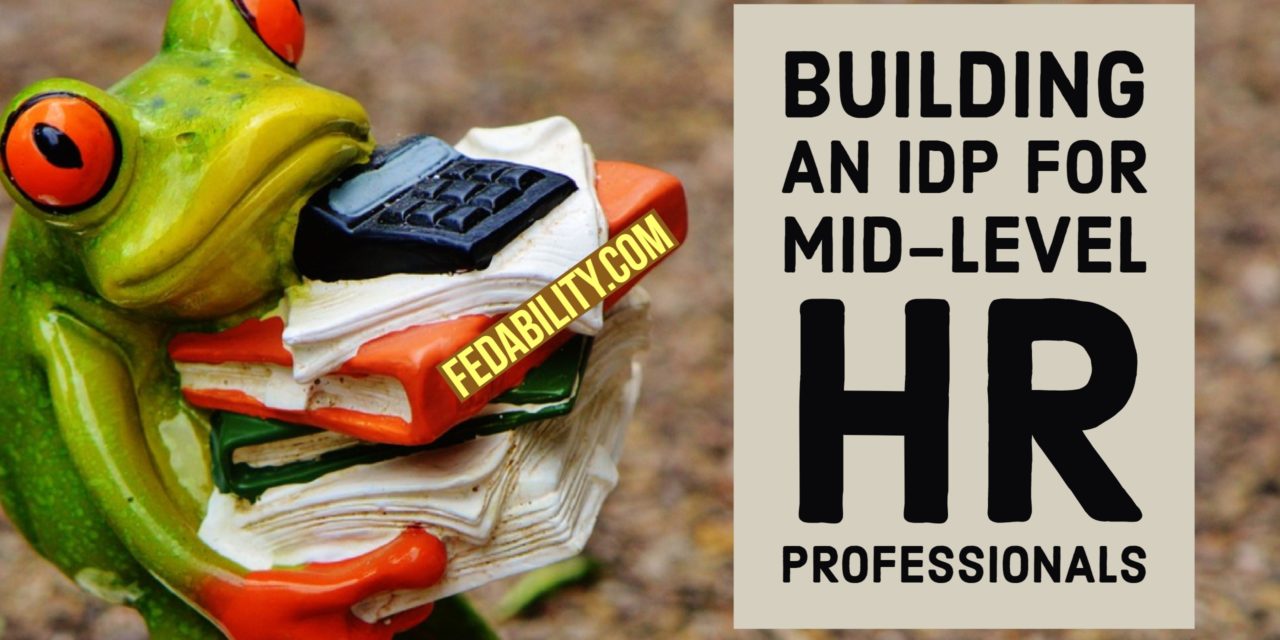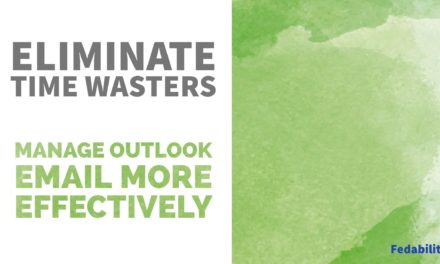If you work in Human Resources (HR) or a related field, you know its important to do some self development. But, despite the assumption that because you work in HR and know the ‘secrets’ of classification, interviewing, and self development- you may not know where to start for yourself. That’s why I wanted to offer a series of posts on what skills you need to develop as you progress within the HR world in government. In this post, we’ll focus on mid-level HR professionals. That is GS12s who are looking to develop themselves into GS13s.
Not in HR? That’s ok. Many of these skills will generalize. Or, you can check out our prior post on the career crisis of grade jealousy versus grade snobbery.
We all want to believe it’s a clear algorithm of meeting certain competency requirements for a position and applying for the position. But, moving up in one’s career is a jumble of skills, hard work, networking, and good timing. But, there are some solid places to start if you are looking to create an IDP for HR professionals. An IDP to help you in this journey of self development and career development as a mid-level HR professional who wants to move up.
In this post, I will focus on the core skills that distinguish someone at an mid-level GS12 from a GS13 in HR. However, if you’re an entry level HR professional, you may want to check out our prior post specifically for IDPs for entry-level HR professionals.
Self development: Where to start building an IDP for HR professionals
Our jobs in HR often depend on our ability to break down a job into it’s parts and pieces. Our ability to understand different levels of proficiency. But, we seldom look in the mirror. Apply those same skills to understanding our own career paths. Like most, we often start looking at those who are in the positions we want to be in. But, as you know, there’s some issues with that approach.
The first place to start is at the source. Our good friends at the Office of Personnel Management (OPM). As you know, OPM is the agency that sets the rules for what it means to be a GS-12 versus a GS-13. So, rather than guessing what your colleague who is at a higher grade is doing – at the risk of the challenges I mentioned above – go to the source.
The second place to start is to remember this. There’s 3 areas that anyone will need to be strong in to be effective in their position. These professional development goals need to include: technical, professional, and problem-solving skills. Take a look at our prior post to get a deeper understanding of why these three areas are most critical.
Differentiating between a GS12 and a GS13
What is the differences in skills needed for an HR professional at the GS 12 level versus the GS 13? I started with the Human Resources Management competency model from OPM. I looked only at the general competencies needed (not the specialized). Going back to our 3 professional goal model, these general competencies would fall into the professional and problem-solving areas.
Needed skills in an IDP for HR professionals
There were 14 areas of skills differences between a GS12 and a GS13 according to OPM’s competency model of HRM professionals. Now, if you read yesterday’s post for entry-level HR professionals, you’ll know there were 14 different competencies to focus on for them too. But, there is only about a 50% overlap.
These areas of skills differences from a GS 12 to a GS 13 include:
|
Intermediate to advanced proficiency |
|
| Creative thinking | Planning and evaluating |
| Decision making | Problem solving |
| Influencing/negotiating | Reasoning |
| Information management | Self-management |
| Legal, government, jurisprudence | Teamwork |
| Oral communication | Technical competence |
| Organizational awareness | Writing |
Building your IDP for HR professionals
Phew! That’s a lot of competencies to have to work on if you want to move from an mid level HR professional GS12 to a GS 13! In fact, you might say it’s too much. And, you’d be right.
So, where do you start?
I’ve looked ahead into the HR professional career path to look at trends in the proficiency growth in these competencies as you progress in your career. I found that there’s actually 3 competencies that will need to continue to grow as you move towards a GS-15. These 3 competencies are where I’d suggest you start. They include:
- Decision making
- Oral communication
- Technical competence
Decision making
According to OPM, decision making is defined as: Makes sound, well-informed, and objective decisions; perceives the impact and implications of decisions; commits to action, even in uncertain situations, to accomplish organizational goals; causes change.
I also find it odd that decision making and problem solving are split up as separate competencies. The two are so tightly tied together. But, I suppose that this separation does point to a common issue- the ability and willingness to make a decision. Too often people get caught up in analysis paralysis. Or, worse, they follow the guidance that if they wait long enough a decision will be made for them.
Beyond the willingness to make a decision – it’s about learning to search out information from multiple sources. The tough part then, is being able to look at each piece of information and determine what is valid, what is not. What is useful information, and what is not. And, most importantly, thinking through the impact (intended or unintended) that may happen if a particular decision is made. A relevant post we’ve recently had covers this concept of being thoughtful about decisions you should or shouldn’t make.
Oral communication
Oral communication is defined by OPM as: Expresses information (for example, ideas or facts) to individuals or groups effectively, taking into account the audience and nature of the information (for example, technical, sensitive, controversial); makes clear and convincing oral presentations; listens to others, attends to nonverbal cues, and responds appropriately.
This is an area where there is a TON of classes available. And, I suppose there might be some value to them. However, my strongest recommendation is to look into a Toastmasters group to join for self development in this area. Most agencies have at least one chapter on property. Which is nice since you don’t have to go somewhere else. But, if you’re a little weirded out by learning to speak in front of coworkers – you can find other chapters that aren’t connected to the agency.
Technical competence
OPM defines technical competence as: Uses knowledge that is acquired through formal training or extensive on-the-job experience to perform one’s job; works with, understands, and evaluates technical information related to the job; advises others on technical issues.
Now this is one of the few areas where I’d recommend formal training for self development.
First, I’d suggest starting HR University. For one, the courses are designed for and by the government (I won’t comment one way or another on whether they’re good courses) for Human Resources Management. For two, there’s a fairly large number of courses available for free.
Second, I’d suggest keeping up with GovExec. Specifically their Pay and Benefits section, and their Fast Forward section. Admittedly, GovExec can seem a little partisan.
Challenge to take action to create an IDP for HR professionals
- Download the Fedability IDP template for Mid-level HR professionals.
- Complete the template by selecting up to 3 competencies for self development. I picked 3 of the 14 competencies that distinguish a GS 12 from a GS 13 HR professional. The areas you want/need to develop may be different.
- Identify a couple methods to develop the competencies you picked for self development. Not sure how to do it? The template offers a list of methods to develop your skills. Or, you could try googling it. “How to develop my influencing skills” Read a few ideas that pop up. Or, send me an email and we can talk through a couple ways to build those skills.
- Tell us what you come up with in the comments below!





